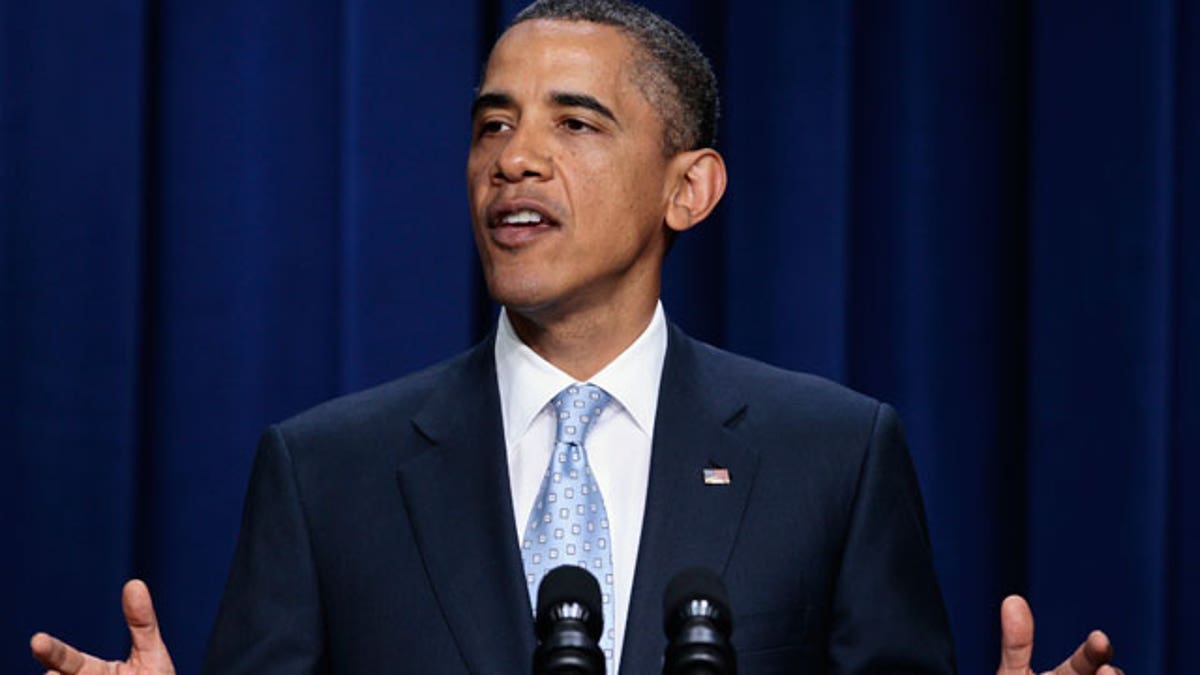
President Barack Obama speaks to military fathers and their children for a screening of Disney/Pixar movie 'Cars 2' in the South Court Auditorium of the Eisenhower Executive Office Building on the White House complex, Wednesday, June 15, 2011. (AP)
President Obama decided he had the legal authority to continue the U.S. military campaign in Libya without congressional approval over the objections of Justice Department and Pentagon lawyers, according to The New York Times.
Instead, the president sided with other senior administration lawyers who said that continuing U.S. participation in the air operations against the regime of Libyan leader Muammar al-Qaddafi did not constitute "hostilities," triggering the need for Congressional permission under the War Powers Resolution, the New York Times reported in its online edition Friday night.
Among those reported to support the president's action were White House counsel Robert Bauer and State Department legal adviser Harold H. Koh, the paper said. Those opposed included Pentagon General Counsel Jeh C. Johnson and acting head of the Justice Department's Office of Legal Counsel Caroline D. Krass.
One issue was reported to be whether firing missiles from drones amounted to hostilities.
Presidents can ignore the advice of the Office of Legal Counsel, but rarely do so, the newspaper reported.
The 1973 law prohibits the military from being involved in actions for more than 60 days without congressional authorization, plus a 30-day extension. The 60-day deadline passed last month with the White House saying it is in compliance with the law. The 90-day mark is Sunday.
"It is very disturbing to learn that the White House deliberately proceeded to continue the war in Libya without congressional authorization, even when it had legal advice from the Pentagon and the Justice Department that our actions in Libya do constitute 'hostilities,'" said Rep. Dennis Kucinich, D-Ohio, who along with nine other lawmakers has filed a federal lawsuit over what he alleges is a violation of the War Powers Resolution.
"We have the makings of a constitutional crisis when the president, who as a U.S. senator acknowledged the duty of a president to come to Congress for permission to conduct a war, simply changes course on his interpretation of the War Powers Resolution and determines to conduct a war absent congressional authorization, even when it is contrary to the best legal advice of the Pentagon and the Justice Department," he said.
Sen. Bob Corker, R-Tenn., a member of the Senate Foreign Relations Committee, said that he found it "interesting that in early April the president touted the Office of Legal Counsel's legal opinion on actions in Libya, and now that the opinion doesn't fit his agenda, he chooses to ignore them."
"If dropping bombs and firing missiles on military installations are not hostilities, I don't know what is," he said. "The president's actions on Libya are nothing short of bizarre."
White House chief spokesman Jay Carney addressed the internal debate over the resolution at his briefing Thursday.
He said "there was a robust process through which the president received the advice he relied on in determining the application" of the War Powers Resolution.
He noted the resolution has been subject to intense debate since it was first enacted in 1973.
"We are not going to get into the internal process by which the president receives legal advice," Carney said. "It should come as no surprise that there would be some disagreements, even within an administration, regarding the application of a statute that is nearly 40 years old to a unique and evolving conflict. Those disagreements are ordinary and healthy."
The Associated Press contributed to this report.





















